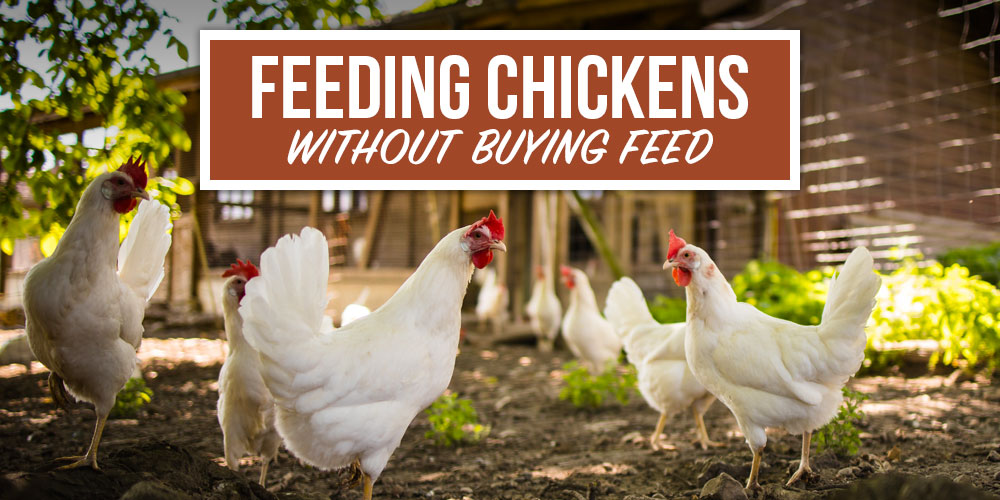
NAVIGATION
Raising chickens gets expensive quickly, so more and more people are brainstorming how to feed chickens without buying feed.
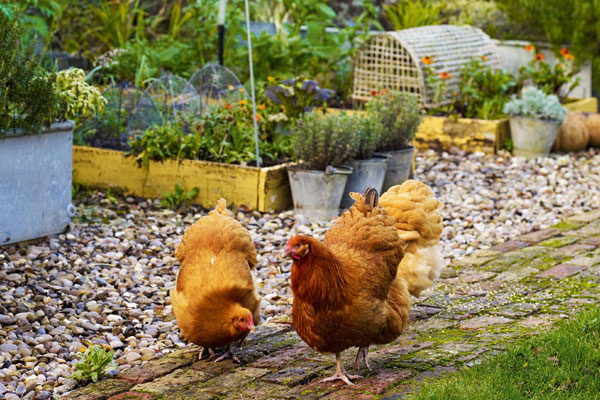 If you’ve read my post on combining your chickens and your garden, you know that I’m all for cutting costs, saving space, and providing natural food for chickens and fertilizer for the garden in one step.
If you’ve read my post on combining your chickens and your garden, you know that I’m all for cutting costs, saving space, and providing natural food for chickens and fertilizer for the garden in one step.
The key thing to remember about using alternative or homegrown chicken feed is that it is only an effective way to cut costs and improve the health of your chickens and their eggs if you are willing to take an active role in feeding your chickens. That role doesn’t need to be difficult or complicated, though, and I have several simple ways you can get started.

Hi, I’m Ryan
I am all about homesteading, and I like to share the practical tips I’ve discovered through years of trial, error, and success. Working to lower the costs and increase the functionality of my chicken coop and garden has been so worth it!

Is It Possible To Feed Chickens Without Buying Feed?

Chickens existed and thrived long before commercial feed, so it is definitely possible to raise chickens without buying feed.
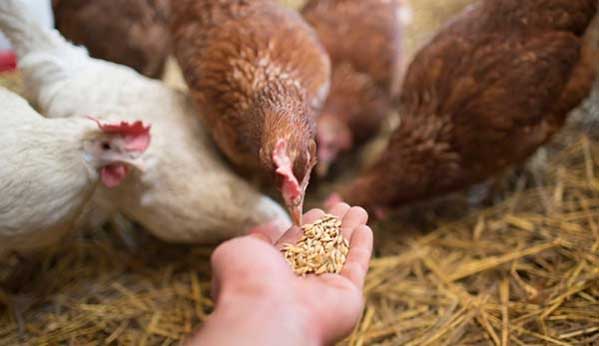 That said, there are reasons commercial grain was developed — most importantly because chickens need a well-rounded diet that is heavy on protein while also being enriched with other nutrients from plants and fruits. Chicken feed meets the nutritional needs of chickens in a convenient way, so if you’re looking for the easiest way of feeding your chickens, that will almost always be feed.
That said, there are reasons commercial grain was developed — most importantly because chickens need a well-rounded diet that is heavy on protein while also being enriched with other nutrients from plants and fruits. Chicken feed meets the nutritional needs of chickens in a convenient way, so if you’re looking for the easiest way of feeding your chickens, that will almost always be feed.
The biggest problem with chicken feed is that the cost can be prohibitive. Especially if you’re buying organic or vitamin-enriched feed, the expense can easily override the benefits of raising chickens. That’s why getting creative with how you feed your chickens can really be worth it in the long run.
Why Raise Chickens Without Buying Commercial Feed?

I like raising chickens without buying feed because of the cost-effectiveness and health and lifestyle benefits for both my chickens and me. While commercial grain is packed with the nutrients your flock needs, vitamins, proteins, and fibers are healthier when consumed from whole foods.
Having Free Range Chickens Can Save You Big Money
The biggest benefit of raising chickens without commercial feed is the amount of money you can save. Of course, you need to work realistically with the resources you have. If you’re able to spend a little extra money right now, but not any extra time, feed might be your best option.
If you have a very limited amount of time to invest, it might be wise to go half and half with feed and alternative foods for a while as you gradually cut back on grain and start supplementing your chickens’ diet with scraps and free ranging. If you do have a fair amount of time to devote to feeding your chickens, putting in the effort to grow your own feed will pay off hugely over time and can over time save you up to 100% of what you’re currently spending on feed.
How Much Does It Cost To Feed Chickens With Commercial Chicken Feed?
Your monthly cost of chicken feed will depend on what type of feed you buy and how many chickens you have, but to give you a ballpark idea, each chicken will eat about $3-$4 of feed per month. This might not sound like a lot, but if you build your flock up to 20, you’re looking at a monthly bill of up to $80.
Many chicken owners work to decrease the amount they’re paying in feed (or use their waste and crops to get rid of any extra cost entirely) so that they’re saving money on their farm fresh eggs and chicken meat instead of paying more than they would if they bought organic eggs or chicken meat from a store.
Free Ranging Can Be Healthier For Your Chickens
Excellent foragers that they are, chickens thrive in a free-range environment where they can peck at bugs, plants, grass, scraps, and carcasses to their little hearts’ content. The larger the space you have for your chickens to plunder the more independent they will be at finding their own food. On top of this, adding healthy scraps and garden plants to their diets will round out the nourishment they need to thrive and lay eggs to their full potential.
As another side benefit of free ranging, because they are busy foraging for food, free-range chickens naturally wear their nails down by scratching the ground and are less prone to fights and other harmful habits caused by boredom.
Homegrown Chicken Feed Can Be Healthier For You
You can see how much healthier the chickens themselves are when free-range foraging in the quality of their eggs. The lower cholesterol and higher vitamin content of free-range eggs raises the nutritional benefits for your family. You can tell a healthy egg by its harder shell and richer colors.
Raising Chickens Without Buying Feed Promotes A Permaculture Lifestyle
Waste from your garden goes into feeding your chickens. Waste from your chickens goes to fertilizing your garden. It’s all about the cycle of life and making use of what would otherwise be refuse.
This type of thinking will help your operation (no matter how big or small) be as independent and sustainable as possible without needing to buy feed or fertilizer.
Alternative Ways To Feed Free Range Chickens Without Buying Feed

You might be thinking, “Wouldn’t it be nice if chickens could just eat grass? Wait…do chickens eat grass?” The answer is yes. Yes, they do. Isn’t that convenient? It really is a mixed blessing, though, because you will need to come up with some strategies to keep your free rangers from destroying your lawn if you have one.
To have foraging chickens and still keep a nice lawn (or garden), build a chicken tractor or a mobile coop to easily transport your chickens from space to space after they’ve fertilized and foraged but before they’ve destroyed your grass or plants.
While chickens will happily eat grass and even hay, you want them to thrive, not just survive, so you’ll want to add more nutrients and variety into their diet. If you’re ready to start supplementing your chickens’ feed, but you’re not sure what to grow, I’ve got some great ideas for you.
Growing Chicken Fodder: Forage Or Grain Crops
Forage and grain crops (such as sunflowers, alfalfa, buckwheat, clover, chickweed, and sorghum) are great because your chickens can graze them independently. If you have the time to harvest some of these crops, though, soaking the grains in water for a few days before feeding them to your chickens will start a fermenting process that has numerous health benefits for your flock. One thing to remember if you’re feeding your chickens grains is that they are almost too high in fiber, so you’ll want to limit the number of grains they have access to and balance their diet with other high-protein options.
Growing Comfrey For Chickens
Comfrey is ideal for feeding chickens because it has the perfect ratio of high protein and low fiber that’s great for chickens in their greens. It’s also rich in vitamins A and B-12, which will increase the nutrition in their eggs. If your chickens don’t like comfrey at first, you can always try shredding it and mixing it with some scraps or compost. You don’t just have to stick to comfrey either — many other herbs (like basil, oregano, fennel, and thyme) make great food for your chickens.
Growing Bushes Or Trees For Chickens
Chickens love fruits and nuts, but this option is definitely not a quick or short-term solution. Berry bushes don’t take as long as trees to grow, but if you’re starting from scratch, it will still take a few years before you have any fruit. This option is for those who are thinking of long-term goals, or for those who have easy access to different fruits and nuts already.
Growing Berries For Chickens
Everyone loves a sweet treat — even chickens. You’ll want to balance anything sweet you give them with higher protein options, but berries can provide vitamins while making your hens happy. Berry bushes such as blueberry and raspberry bushes are relatively easy to grow, but they do take up quite a bit of space.
Grow Nut And Fruit Trees
Chickens love all kinds of nuts (if you crack them open first), and they’re even more crazy about fruits like apples, peaches, and cherries. If you don’t have access to an orchard or even a few nut or fruit trees, don’t stress. Your chickens will enjoy some occasional leftover nuts or apples when you have them.
Growing Potatoes, Pumpkins, And Winter Squash For Your Chickens
There are lots of garden vegetables you can grow for your chickens, but potatoes, pumpkins, and winter squash are particularly easy to grow, feed to your flock, and store for a long time. Potatoes are great for the heart and bone health of your flock, and squash is packed with vitamins your chickens need to stay healthy such as zinc, vitamin A, and vitamin C.
Get rid of garden pests and nourish your chickens at the same time with a chicken garden combo or a chicken tractor, or drop the beetles invading your garden into water and feed them to your flock.
Growing Grubs And Larvae For Chickens
Growing grubs for chickens might sound disgusting, but it is an easy and cost-effective way to provide good nutrition to your flock.
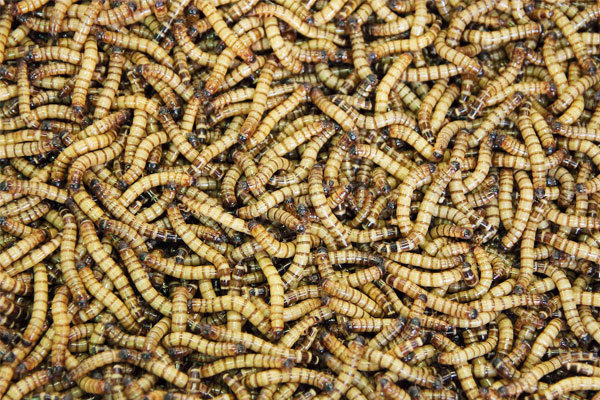 One of the best options here is black soldier fly larvae because they are packed with vitamins, proteins, fats, and minerals that can help your chickens thrive in colder months when they can’t get these nutrients easily from fruits and vegetables. You can simply and inexpensively create a bin for rotten vegetables that these soldier flies will love to lay their eggs in — free chicken grub!
One of the best options here is black soldier fly larvae because they are packed with vitamins, proteins, fats, and minerals that can help your chickens thrive in colder months when they can’t get these nutrients easily from fruits and vegetables. You can simply and inexpensively create a bin for rotten vegetables that these soldier flies will love to lay their eggs in — free chicken grub!
Another option here is raising mealworms to feed your chickens. Mealworms are larvae-stage darkling beetles that provide a high-protein treat for chickens who will gobble them up like candy.
Build A Maggot Bucket
Along the same lines as a larvae bin is a maggot bucket. For this, though, you’ll want some decomposing meat (think roadkill, predators you have caught, carcasses from hunting or fishing) to put in a suspended bucket with some drilled holes. As the meat decomposes and flies lay eggs, high-protein maggots will start falling onto the ground for your chickens to eat.
Use A Pond To Grow Duckweed For Chickens
High in protein, duckweed is a great option to help feed your chickens because it grows easily (with pretty much no work on your end) in any still water with access to sunlight.
This handy little plant can provide a lifetime of free chicken feed for your flock as it will continue to multiply on its own.

Raising Feeder Fish For Chickens
If you’ve already got a pond where you’re growing duckweed, fish are a healthy option for your little scavengers, and they can become an easy, self-replenishing source of food. Guppies or feeder goldfish are perfect for this. Of course, you will have to do the work of catching the fish and feeding them to your chickens, but once the pond is stocked, this is all you’ll have to do to keep up this alternative chicken food source.
Feeding Meat To Your Chickens
Meats other than fish are good sources of protein for your chickens, but don’t go out and buy any steaks or ribs. Your flock aren’t fine diners when it comes to meat, believe me. They will enjoy table scraps, mice, roadkill, or predator animal carcasses you’ve caught in traps as much as they would the finest cut of tenderloin.
Use Food Waste And Scraps To Feed Your Chickens Without Buying Feed
Here’s where you can get pretty creative. Extras, leftovers, and waste from lots of different food groups can be great for your chickens, and you’ll feel good about giving them a nice treat. Just make sure you’re feeding them scraps that are healthy for them and not toxic. Most veggies and meats will do nicely.
Waste And Scraps Chickens Will Love
- Kitchen scraps
- Restaurant scraps
- Extra eggs or eggshells
- Fishing waste
- Butchering waste
- Cheesemaking waste
- Canning Waste
- Leftover Pumpkins
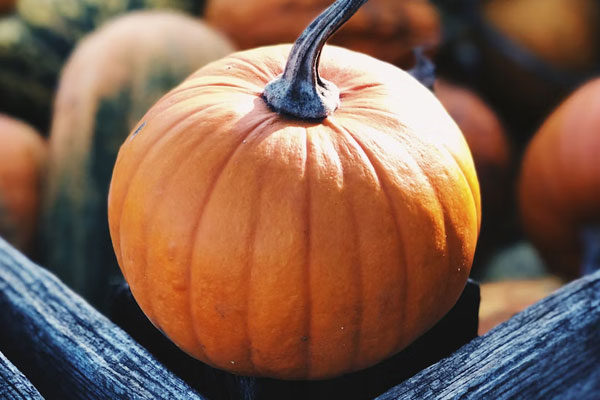
Compost As Homegrown Chicken Feed
If you already have a garden, chances are you’re at least familiar with the idea of composting. Having a compost pile really is as simple or as complicated as you make it. Most of the work is building a compost bin, and after that, you just need to keep it supplied with chicken food scraps, lawn clippings, and any other organic degradable matter safe for your chickens. Chickens will love pecking at the scraps and bugs in this pile, and as they eat from it and scratch their own poop into it, whatever is left will make excellent fertilizer for your garden.
Foods To Avoid Feeding To Your Chickens
Chickens will generally avoid foods that are toxic for them or that will mess with their digestion, but they are also known to eat just about anything when desperate (they’ll even eat rocks). If you’re ever not positive about some scraps or crops you want to give your chickens, a quick Google search can most likely fill you in, but here are some foods to always avoid.
Don’t Give These Foods To Your Chickens
- Chocolate
- Anything moldy
- Citrus fruits
- Avocado
- Tomatoes
- Rice that isn’t cooked
- Anything salty
- Rhubarb leaves
- Raw or dried beans
- Foxglove
- Lupine
- Holly
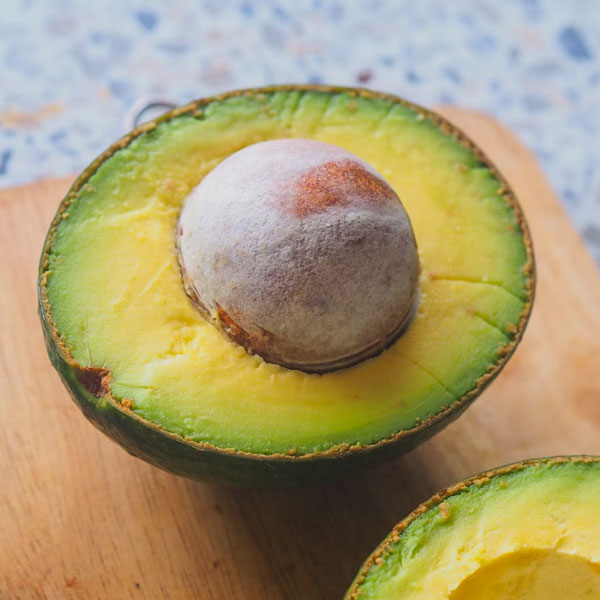
Tips To Quickly Start Feeding Chickens Without Buying Feed

Be willing to start small. Wean your chickens off chicken feed gradually as you get more confident in how much you will generate in scraps and how much you will be able to grow for them. Before you begin, make sure you have a good understanding of how to provide the best nourishment for the least amount of money and start investing in the best plant options and other systems.
Work With What You Have For Alternative Chicken Feed
Start by taking stock of what you have. The space and time you have to work with will form your natural boundaries, but what are your natural assets? If you already have a vegetable garden, start there. Think about how much access you have to any trees, bushes, ponds, or scraps that could help feed your flock. If you know a farmer or a restaurant owner, would they mind sending some compost, waste, or scraps your way? Do you have supplies to go ahead and set up a compost bin or a maggot bucket that can provide some easy nutrition? Don’t be afraid to think outside the box — your chickens will love variety!
Invest In Some Quick-Growing Plants For Chickens
When you’re just getting started growing your own chicken food, you’ll want to plant some crops that will grow quickly and start feeding your chickens as soon as possible.
Start With These Fast-Growing Plants
- Wheatgrass: A fast-growing grass for chickens that takes only two weeks to sprout and is packed with good nutrients.
- Millet: A particularly good grain option as it matures in under 70 days and will grow anywhere.
- Stinging Nettles: Fast-growing plants (80-90 days) that are safe and nutritious for chickens in spite of their name.
- Romaine Lettuce: Packed with calcium, potassium, and vitamins A, C, and K. Romaine grows in under 80 days.
- Field Peas: High in protein and growing in 60-90 days, peas can be fed to your chickens any way except dried.
- Radishes: A root vegetable loved by chickens that grows in six to eight weeks.
- Mustard Greens: A leafy green high in vitamins A, C, E, K, and B-6 that grows in about 6 weeks.
Start A Grazing Box For Homegrown Chicken Feed
Even if you don’t have room or time for much of a garden, you probably have room and time to create one raised bed inside your chicken coop. Use your leftover seeds to plant some fast-growing grass or quick-growing plants and cover the box in chicken wire that allows the chickens to peck at the leaves and vegetables without actually damaging the roots.
Have A Plan For Alternative Chicken Feed In Changing Seasons
If you’re starting the process of growing your own chicken food in the spring, don’t forget that fall and winter are coming! Don’t let this discourage you, but you will want to formulate a plan for keeping up with your flock’s nutritional needs during the colder months. Store some long-lasting vegetables like potatoes and squash. Nuts also make great fall food when other options are starting to go out of season.
Your Turn!
- What are some creative ways you have found to feed your chickens?
- Have you noticed differences in egg quality between grain-fed and free-range chickens?














Leave a Reply